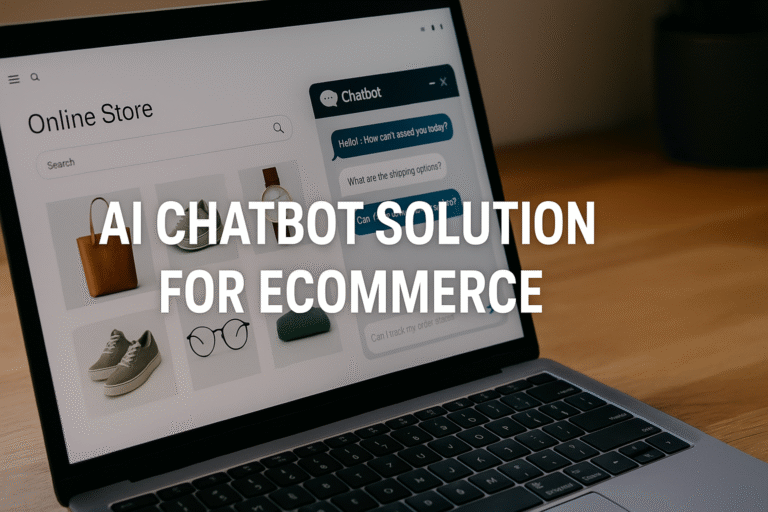The ecommerce landscape has transformed rapidly in recent years, with customer expectations for instant support, personalized experiences, and seamless shopping journeys higher than ever. In this dynamic environment, AI chatbot solutions for ecommerce have emerged as powerful tools that automate customer interactions, enhance user experience, and drive conversions.
AI chatbots are no longer just basic rule-based systems; they now leverage advanced technologies such as machine learning (ML), natural language processing (NLP), and large language models (LLMs) to understand user queries, intent, and context. For ecommerce businesses, this means 24/7 support, efficient query resolution, and significantly improved customer satisfaction.
In this blog, we’ll explore the technical foundations of ecommerce chatbots, evaluate their effectiveness, discuss potential alternatives, and conclude by showcasing how Expertrec can help you integrate smart AI chatbot functionalities into your ecommerce platform.
What Is an AI Chatbot Solution for Ecommerce?
An AI chatbot for ecommerce is a virtual assistant integrated into online stores that interacts with users in real time. It can assist with:
- Answering product-related queries
- Tracking orders and managing returns
- Providing personalized product recommendations
- Handling customer complaints or feedback
- Upselling and cross-selling
These bots use AI models trained on vast datasets to understand and respond to user inputs in a human-like manner. Unlike traditional bots with rigid flows, AI chatbots can dynamically adapt to varying customer inputs.
Key Components of an AI Ecommerce Chatbot
- Natural Language Processing (NLP): Helps in understanding user input regardless of phrasing.
- Intent Recognition Engine: Determines what the customer wants (e.g., “track my order”).
- Dialogue Management: Maintains contextual memory across multiple user interactions.
- Integration Layer: Connects to ecommerce backend (e.g., product catalog, order management system).
- Analytics Dashboard: Tracks bot performance and user behavior.
Technical Depth: How It Works
NLP & Machine Learning
AI chatbots in ecommerce rely heavily on transformer-based models (e.g., BERT, GPT) to comprehend customer queries. The architecture involves tokenization, entity extraction, intent classification, and response generation.
For instance:
- Input: “Can you show me red dresses under $100?”
- NLP Tasks:
- Entity Extraction: {“color”: “red”, “price”: “<100”}
- Intent: Product search
- Sent to backend search engine/API
Backend Integration
These chatbots are typically connected to the ecommerce platform through APIs. For example:
- Product database APIs to fetch real-time inventory
- Order management APIs to retrieve order status
- CRM integrations for personalized messaging
Omnichannel Deployment
Modern ecommerce chatbots support:
- Website live chat widgets
- Mobile apps
- Social channels (WhatsApp, Facebook Messenger, Instagram DMs)
Is It Worth Using an AI Chatbot for Ecommerce?
The short answer: absolutely, provided it’s implemented correctly. Here’s why:
Benefits
- 24/7 Support: Never miss a customer query.
- Operational Efficiency: Reduces human agent load by automating FAQs and routine tasks.
- Improved UX: Conversational shopping and instant replies increase engagement.
- Conversion Boost: Bots can upsell and guide customers to purchase.
- Scalability: Easily handles thousands of concurrent users.
Challenges
- Initial setup cost and complexity
- Training data quality can impact accuracy
- May require ongoing NLP model fine-tuning
- Overreliance may alienate users preferring human support
Overall, the ROI of AI chatbots in ecommerce is high when combined with robust backend integrations, analytics, and conversational UX design.
Are There Better Alternatives?
While AI chatbots are powerful, some alternatives may suit specific use cases:
1. Live Chat with Human Agents
- Offers real-time support with empathy
- Not scalable or cost-efficient for high-volume stores
2. Rule-Based Chatbots
- Suitable for simple, predictable tasks
- Lack flexibility and contextual understanding
3. Voice Assistants (e.g., Alexa, Google Assistant)
- Emerging for ecommerce use cases
- Requires voice-friendly UI/UX design and complex backend setups
4. Self-Service Knowledge Bases
- Great for information retrieval
- Not conversational or proactive
In most scenarios, a hybrid model—combining AI chatbots with human agents and other tools—is ideal.
Why Choose Expertrec’s AI Chatbot for Ecommerce?
Expertrec offers an intelligent AI-powered chatbot solution tailored specifically for ecommerce businesses. Here’s what sets Expertrec apart:
- No-Code Setup: Easily integrate into your website without heavy technical resources.
- Seamless Backend Integration: Works smoothly with product databases, CRMs, and order systems.
- Smart Recommendations: Uses AI to upsell/cross-sell based on user behavior.
- Customizable UI: Matches your brand design and supports multilingual chat.
- Search + Chat: Combines Expertrec’s advanced AI search engine with chat for enhanced navigation.
By leveraging Expertrec’s chatbot, businesses can offer truly personalized and intelligent shopping support that drives conversions and reduces support overhead.
Conclusion
AI chatbot solutions for ecommerce are no longer optional they’re a necessity for brands aiming to deliver top-tier customer experiences. From smarter query handling to driving revenue through contextual interactions, AI-powered chatbots are transforming how customers engage with ecommerce platforms.
While alternatives exist, none offer the scalability, intelligence, and personalization that AI chatbots deliver when properly implemented. Platforms like Expertrec simplify the deployment process, making it easier than ever to adopt AI in your ecommerce stack.
FAQs
AI chatbots use machine learning and NLP to understand user intent and context, whereas regular chatbots follow predefined rules and scripts.
2. Can an AI chatbot help increase ecommerce sales?
Yes. AI chatbots provide personalized recommendations, guide users through the purchase funnel, and offer real-time support—improving conversion rates.
3. Do AI chatbots require coding skills to set up?
Not necessarily. Platforms like Expertrec offer no-code or low-code solutions for quick setup.
4. How secure are ecommerce AI chatbots?
They are secure if built with proper encryption, API authentication, and adherence to data privacy regulations like GDPR.
5. How do I train my AI chatbot?
Training involves feeding your chatbot high-quality data, user interaction logs, and regularly updating it based on new queries and patterns.




